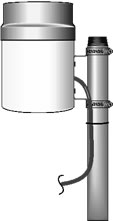This product is no longer available and has been replaced by: TE525-L. Some accessories, replacement parts, or services may still be available.

| Services Available |
|---|
Overview
The TE525-LC has a 6" orifice and measures rainfall in 0.01 inch increments. The TE525-LC funnels precipitation into a bucket mechanism that tips when filled to a calibrated level.
Read MoreImages

Technical Description
This version of the TE525 rain gage has a connector rather than the standard pigtails. The connector attaches to the CS110 Electric Field Meter or MetData1 Weather Station. The TE525-LC has a 6" orifice and measures rainfall in 0.01 inch increments. The TE525-LC funnels precipitation into a bucket mechanism that tips when filled to a calibrated level.
Compatibility
The connector can be attached to the CS110 Electric Field Meter or MetData1 Weather Station. The CS110 has a CR1000 and the MetData1 has an on-board CR10X.
Specifications
- Sensor Type: Tipping bucket/magnetic reed switch
- Material: Anodized aluminum
- Resolution: 1 tip
- Volume per Tip: 0.16 fl. oz/tip (4.73 ml/tip)
- Rainfall per Tip: 0.01" (0.254 mm)
- Accuracy
- Up to 1 inch/hr: ±1%
- 1 to 2 inch/hr: +0, -3%
- 2 to 3 inch/hr: +0, -5%
Related Documents
Related FAQs
Number of FAQs related to TE525-LC: 4
Expand AllCollapse All
-
The information included on a calibration sheet differs with each sensor. For some sensors, the sheet contains coefficients necessary to program a datalogger. For other sensors, the calibration sheet is a pass/fail report.
-
This depends on the information contained in the calibration sheet:
- If the calibration sheet contains coefficient information, Campbell Scientific keeps a copy, and a replacement copy can be requested.
- If the calibration sheet does not contain coefficients, Campbell Scientific does not keep a copy. It may be possible to contact the original manufacturer for a replacement copy.
-
Most Campbell Scientific sensors are available as an –L, which indicates a user-specified cable length. If a sensor is listed as an –LX model (where “X” is some other character), that sensor’s cable has a user-specified length, but it terminates with a specific connector for a unique system:
- An –LC model has a user-specified cable length for connection to an ET107, CS110, or retired Metdata1.
- An –LQ model has a user-specified cable length for connection to a RAWS-P weather station.
If a sensor does not have an –L or other –LX designation after the main model number, the sensor has a set cable length. The cable length is listed at the end of the Description field on the product’s Ordering tab. For example, the 034B-ET model has a description of “Met One Wind Set for ET Station, 67 inch Cable.” Products with a set cable length terminate, as a default, with pigtails.
If a cable terminates with a special connector for a unique system, the end of the model number designates which system. For example, the 034B-ET model designates the sensor as a 034B for an ET107 system.
- –ET models terminate with the connector for an ET107 weather station.
- –ETM models terminate with the connector for an ET107 weather station, but they also include a special system mounting, which is often convenient when purchasing a replacement part.
- –QD models terminate with the connector for a RAWS-F Quick Deployment Station.
- –PW models terminate with the connector for a PWENC or pre-wired system.
-
Many Campbell Scientific sensors are available with different cable termination options. These options include the following:
- The –PT (–PT w/Tinned Wires) option is the default option and does not display on the product line as the other options do. The cable terminates in pigtails that connect directly to a datalogger.
- In the –C (–C w/ET/CS110 Connector) option, the cable terminates in a connector that attaches to a CS110 Electric Field Meter or an ET-series weather station.
- In the –CWS (–CWS w/CWS900 Connector) option, the cable terminates in a connector that attaches to a CWS900-series interface. Connection to a CWS900-series interface allows the sensor to be used in a wireless sensor network.
- In the –PW (–PW w/Pre-Wire Connector) option, the cable terminates in a connector that attaches to a prewired enclosure.
- In the –RQ (–RQ w/RAWS Connector) option, the cable terminates in a connector that attaches to a RAWS-P Permanent Remote Automated Weather Station.
Note: The availability of cable termination options varies by sensor. For example, sensors may have none, two, or several options to choose from. If a desired option is not listed for a specific sensor, contact an application engineer at Campbell Scientific for assistance.
